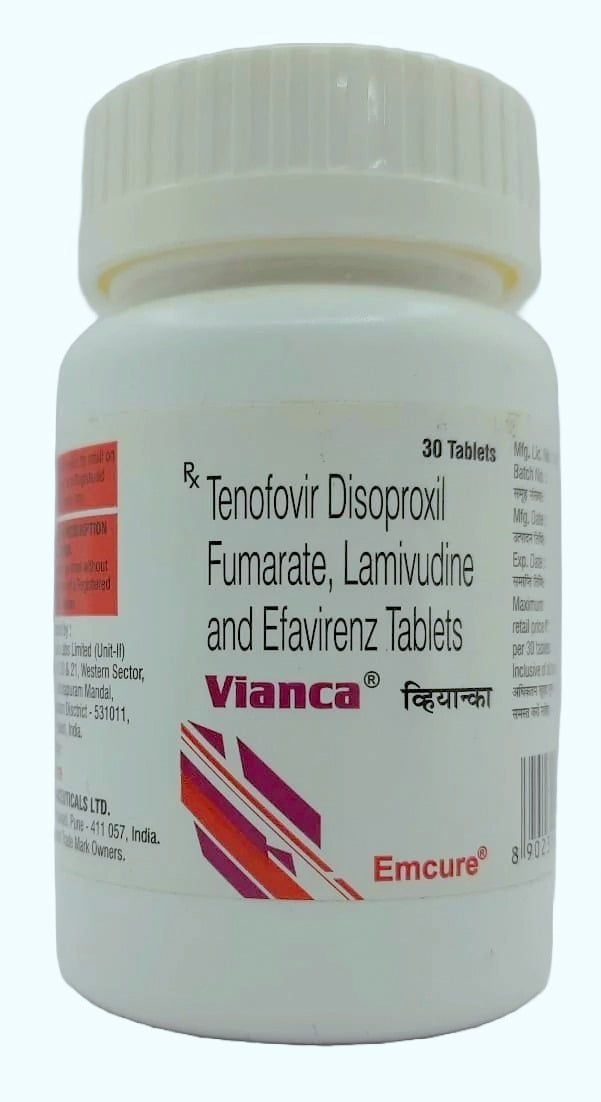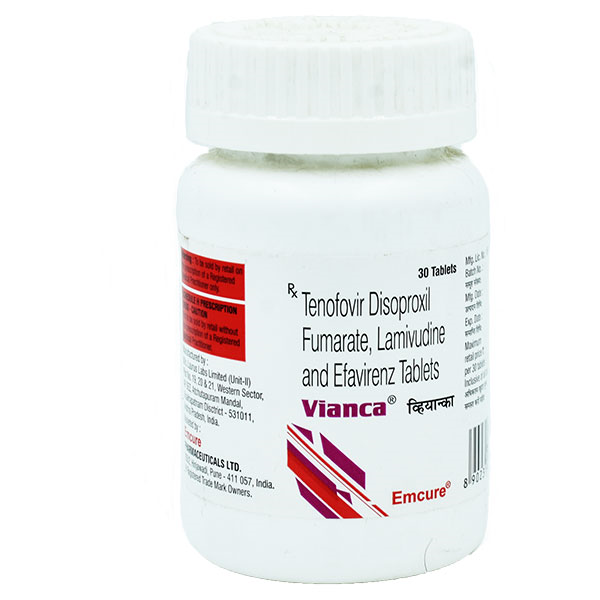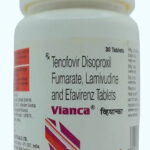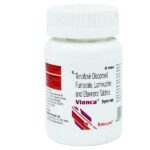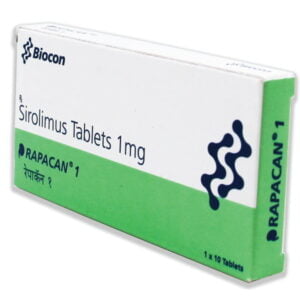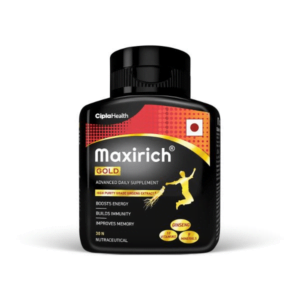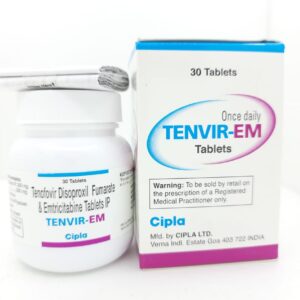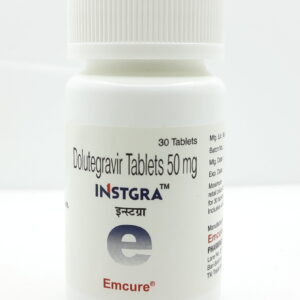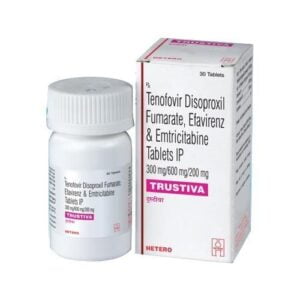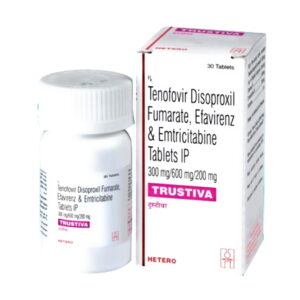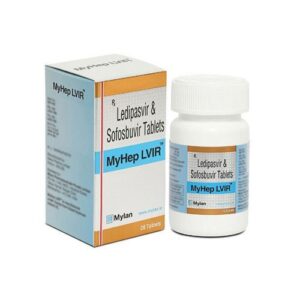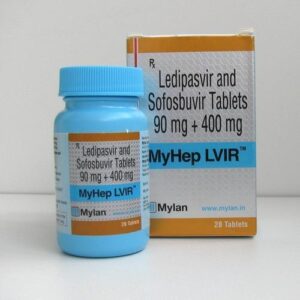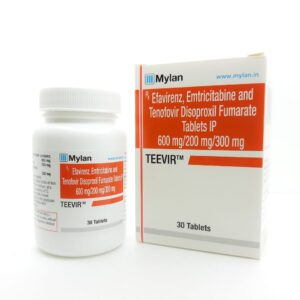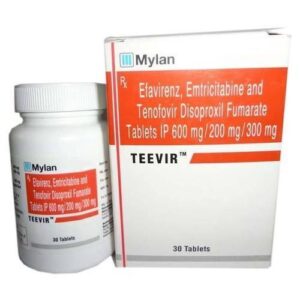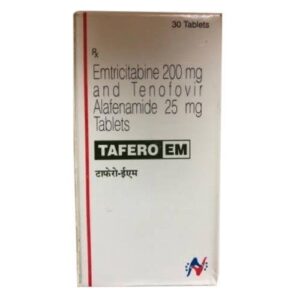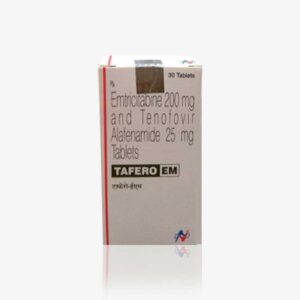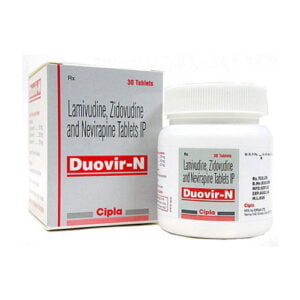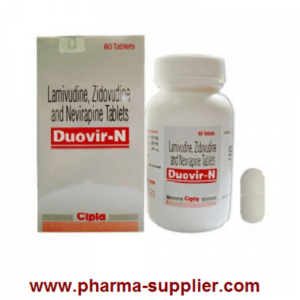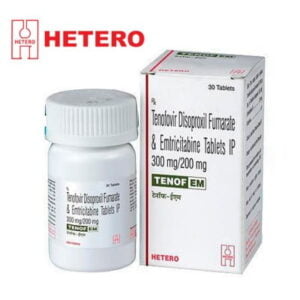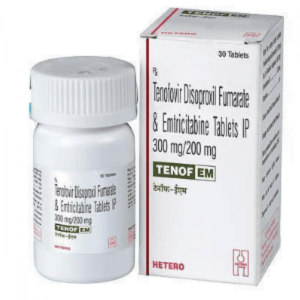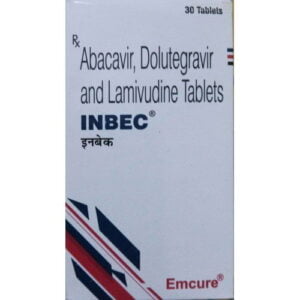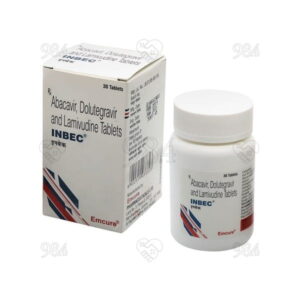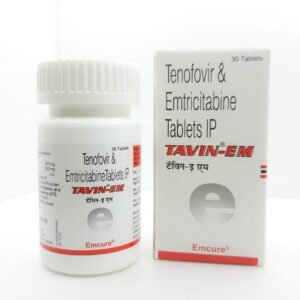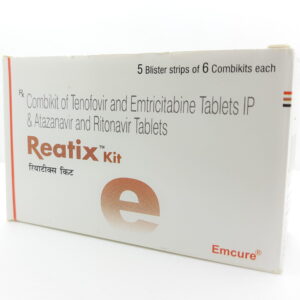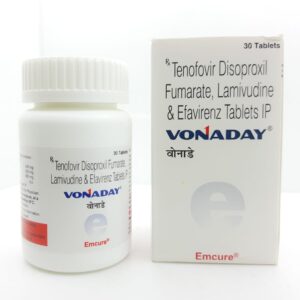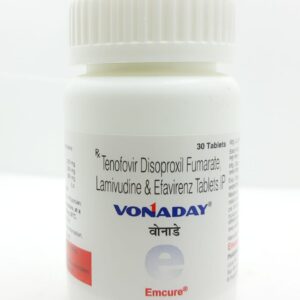Last Updated on November 23, 2024 by admin
Vianca Tablet Introduction
Vianca Tablet is a combination of antiretrovirals medicines. It is prescribed to treat HIV (human immunodeficiency virus) infection. It boosts up the immunity to fight against HIV to manage or treat AIDS (acquired immunodeficiency syndrome).
Vianca Tablet restricts the growth of HIV in the body and reduces the risk of getting HIV-related complications to improve the lifespan of an individual. The medicine should be taken in an empty stomach, preferably at bedtime for better efficacy. Taking these medicines regularly at the same time increases their effectiveness. A dose of this medicine must not be missed as it can affect your recovery. It is important to complete the full course of the treatment until your doctor advises you to stop it.
The most common side effects of this medicine are impaired concentration, abnormal dreams, headache, nausea, weakness and fatigue, nasal congestion, diarrhea, rash, dizziness, trouble sleeping, pain, depression, and cough. These are usually not serious and go away within 2-4 weeks of treatment, however, inform your doctor if they bother you or do not go away. As it can also make you feel dizzy or drowsy, it is advised to avoid driving. In addition to that, avoid alcohol consumption as it may increase the intensity of the side effects.
Before starting with the treatment, you should consult your doctor if you are pregnant or breastfeeding, or have any kidney, liver, or other diseases. Your doctor may suggest some laboratory tests before and during the treatment to check your blood counts, liver and kidney functioning, and other health and mental conditions. If you are HIV positive, you should not breastfeed or share personal belongings like razors or toothbrushes. Consult your doctor to know about safe sex methods to prevent transmission of HIV during intercourse.
USES OF VIANCA TABLET
Vianca is a significant pharmaceutical intervention designed primarily for managing HIV-1 infections in both adults and pediatric patients aged 12 years and older, weighing at least 35 kilograms. The medication comprises a combination of efavirenz, lamivudine, and tenofovir disoproxil fumarate, each of which plays a pivotal role in suppressing the viral load in individuals living with this chronic condition. The primary use of Vianca is to achieve viral suppression, thereby improving the immune function and quality of life for those affected by HIV-1.
Utilized as part of a comprehensive antiretroviral treatment regimen, Vianca helps in enhancing adherence to therapy. The once-daily dosing makes it a convenient option for patients who may otherwise struggle with more complex treatment schedules. This simplified regimen facilitates better compliance, essential for the effectiveness of the treatment and the prevention of drug resistance.
Beyond its primary use in treating HIV-1, Vianca can also serve as part of a broader strategy in combination therapy, often integrated with other antiretroviral agents to maximize efficacy. By operating synergistically with various medications, it can contribute to a more robust treatment protocol tailored to individual patient needs. Such combinations may include integrase inhibitors or protease inhibitors, enhancing the overall effectiveness of HIV management.
Furthermore, the medication underscores the importance of comprehensive patient monitoring and regular evaluations by healthcare professionals to ensure optimal outcomes. It is critical for practitioners to remain vigilant in assessing viral load and adherence levels in patients, adjusting treatment regimens as needed to maintain an effective response. Thus, the role of Vianca extends beyond merely controlling HIV-1 infection, encompassing a holistic approach to patient health and well-being.
Directions for Use
Vianca is an antiretroviral medication primarily used in the treatment of HIV-1 infection in adults and pediatric patients weighing at least 30 kg. To ensure the effectiveness of this medication, it is paramount to follow the prescribed directions for use meticulously. The recommended dosage of Vianca is one tablet taken orally once daily, preferably at the same time each day. This consistency helps maintain stable drug levels within the body, potentially enhancing therapeutic outcomes.
Patients may take Vianca either with food or on an empty stomach; however, taking it with food may help mitigate possible gastrointestinal discomfort. It is advised to avoid consuming alcohol or certain supplements that may interfere with the medication’s efficacy. For optimal results, the patient should ensure that they consume the entire tablet without chewing, crushing, or splitting it.
In instances where a dose is missed, the patient should take the missed dose as soon as they remember. However, if it is almost time for the next scheduled dose, they should skip the missed dose and proceed with their regular dosing routine. It is crucial not to double up on doses to compensate for a missed one, as this could increase the risk of side effects or adverse reactions.
Additionally, patients are encouraged to maintain regular consultations with their healthcare provider to monitor progress and discuss any concerns regarding their treatment regimen with Vianca. Adhering to these guidelines will help optimize the benefits while minimizing potential risks associated with improper use of the medication. Continued education regarding this treatment is essential for maintaining overall well-being in individuals living with HIV.
BENEFITS OF VIANCA TABLET
- In Treatment of HIV infection
Vianca Tablet prevents HIV from multiplying in the body. It helps control the infection and make the immune system work better. This lowers the chances of getting complications, such as new infections, and improves the quality of life.
It is not a cure of HIV or AIDS and should not be used to prevent HIV after accidental exposure to a risk. It is important to take this medicine as prescribed by the doctor. Taking all doses in the right amount at the right times greatly increases the effectiveness of this combination of medicines and reduces the chances of HIV infection becoming resistant to antiretroviral medicines. Although taking this medicine does not prevent the passing of HIV to other people.
Storage Recommendations for Vianca
Proper storage of Vianca is crucial to ensure its efficacy and safety. This medication should be stored at room temperature, ideally between 68°F to 77°F (20°C to 25°C). Exposure to temperature fluctuations outside this range can affect its stability and effectiveness. It is essential to avoid storing Vianca in areas that experience high heat, moisture, or direct sunlight, such as bathrooms or near windows. Humidity can degrade the formulation of the medication, so it is prudent to keep it in a dry environment.
Moreover, it is important to pay attention to expiration dates provided by the manufacturer. Medications like Vianca can become less effective or even harmful after their designated expiration date has passed. Therefore, before using any dosage, always check the label to ensure the medication has not expired. If you find that the medication is past its expiration or if you notice any changes in color, consistency, or packaging integrity, it is advisable to dispose of it properly and consult your healthcare provider for a replacement.
For the safety of children and others in your household, keep Vianca out of reach. Consider using a locked cabinet or a high shelf to prevent accidental ingestion. If you have any concerns or questions regarding the proper storage of Vianca, do not hesitate to seek advice from a healthcare professional or pharmacist. They can provide additional assistance to ensure that the medication is stored appropriately. Following these storage guidelines will help maintain the integrity of Vianca and foster safe medication practices.
Medicinal Benefits
Vianca is an antiretroviral medication that has garnered attention for its significant role in the management of HIV. The drug comprises a combination of efavirenz, lamivudine, and tenofovir disoproxil fumarate. Its approved use is primarily focused on treating individuals diagnosed with HIV-1, including both treatment-naive patients and those who have received prior therapy. This combination works by suppressing the replication of the virus, which is crucial in managing the health of individuals living with HIV.
The effectiveness of Vianca in reducing the HIV viral load is well-documented. By inhibiting the reverse transcriptase enzyme, the drug successfully limits the virus’s capacity to replicate, leading to lower viral loads in patients. A sustained reduction in viral load is essential, as it contributes to improved health outcomes and reduces the risk of HIV transmission. Clinical studies have shown that a considerable percentage of patients treated with Vianca achieve viral suppression, demonstrating the drug’s potency as part of an effective HIV treatment regimen.
Beyond its antiviral properties, Vianca may also promote enhancements in immune function. By lowering the viral load and maintaining a higher CD4 cell count, patients may experience a general improvement in their immune system’s health. This aspect is vital as HIV weakens the immune response over time, making individuals more susceptible to opportunistic infections. The use of Vianca, therefore, not only aids in controlling the virus but also supports overall immune reconstitution, which is vital for long-term health. Regular monitoring and adherence to the prescribed regimen are essential for maximizing the benefits of this medication.
Drug Warnings
Vianca, a medication utilized in the management of HIV-1 infection, comes with important warnings that must be heeded to ensure patient safety and treatment efficacy. One critical warning is its contraindication in patients with a known hypersensitivity to its components, namely efavirenz, lamivudine, and tenofovir disoproxil fumarate. Individuals with such allergies should not be administered this drug to avoid severe adverse reactions.
Another significant concern involves special populations, particularly pregnant individuals. Vianca is categorized under the FDA pregnancy category D, suggesting that it may pose risks to fetal development. Therefore, it is essential for healthcare providers to evaluate the potential benefits versus risks in pregnant patients, and alternative therapies should be considered when appropriate. Likewise, for individuals with liver disease, particularly those with severe impairment, the use of Vianca necessitates careful consideration and monitoring. Hepatic function should be assessed prior to initiation and periodically throughout treatment due to the potential for altered drug metabolism.
Moreover, regular monitoring for side effects is crucial for those on Vianca, particularly regarding neuropsychiatric symptoms, as efavirenz can lead to dizziness, insomnia, and changes in mood or behavior. Patients should be informed about these potential effects and encouraged to report any concerning symptoms promptly. Healthcare professionals should also monitor renal function, given that tenofovir disoproxil fumarate has been associated with renal toxicity in some cases.
In summary, while Vianca can be an effective treatment option for HIV-1, adhering to warnings regarding contraindications, special population considerations, and necessary follow-up monitoring is paramount for safe and effective use.
Drug Interactions
Understanding drug interactions is essential for anyone using Vianca, as these interactions can significantly affect treatment efficacy and safety. Vianca is an antiretroviral medication prescribed for the treatment of HIV-1. However, it can interact with various substances, leading to either diminished effectiveness or heightened side effects. As such, healthcare providers should assess a patient’s entire medication regimen, including over-the-counter drugs and herbal supplements, prior to prescribing Trilavir Mini.
One notable class of medications that may interact with Vianca are other antiviral agents. For instance, the concurrent use of other HIV medications, such as protease inhibitors or non-nucleoside reverse transcriptase inhibitors, can result in additive side effects or alterations in drug metabolism. This may necessitate dose adjustments or close monitoring by healthcare professionals to mitigate the risk of adverse reactions.
Furthermore, several classes of over-the-counter medications, particularly those affecting liver enzymes, may interfere with the pharmacokinetics of Vianca. Medications such as antacids, laxatives, or certain pain relievers can influence how the body processes Vianca, potentially leading to suboptimal blood levels and reduced antiviral efficacy. Patients should discuss the use of any over-the-counter drugs with their healthcare provider to ensure safe and effective use alongside Vianca.
Herbal supplements, including St. John’s Wort, are particularly concerning because they are known to induce certain enzymes that metabolize drugs. The interaction between St. John’s Wort and Vianca may lead to decreased levels of the medication in the bloodstream, resulting in inadequate viral suppression. It is crucial for patients to avoid self-medicating with herbal products without consulting their healthcare provider to prevent any potential negative interactions.
In conclusion, awareness and proactive management of potential drug interactions with Vianca are critical for optimizing treatment results and ensuring patient safety. Regular communication with healthcare providers about all medications, including over-the-counter drugs and herbal supplements, is strongly advised.
SIDE EFFECTS OF VIANCA TABLET
Vianca, a prescription medication commonly used in the treatment of HIV-1 infection, may lead to a range of side effects, which can vary from mild to severe. Understanding these potential reactions is vital for patients to manage their health effectively. Mild side effects that some individuals may experience include nausea, diarrhea, dizziness, and fatigue. These symptoms often diminish as the body adjusts to the medication.
More serious side effects, though less common, require immediate medical attention. These can include symptoms such as severe skin reactions, liver problems indicated by jaundice (yellowing of the skin or eyes), or signs of lactic acidosis, which may present as unusual muscle pain, difficulty breathing, or extreme fatigue. Mental health issues, such as depression or suicidal thoughts, can also arise in some patients taking Vianca, necessitating timely assistance from healthcare professionals.
Patients are advised to monitor their health closely and inform their healthcare provider about any severe or troubling symptoms. It is essential to balance the benefits of Vianca against the potential for side effects. While many individuals tolerate the medication well with minimal discomfort, others may find that side effects impact their quality of life.
Additionally, reviewing one’s medical history with a healthcare provider is crucial, as certain pre-existing conditions could exacerbate side effects. Regular follow-ups and open communication regarding any changes in health status can aid in early detection of any complications arising from the use of Vianca.
In conclusion, while Vianca is effective for managing HIV, awareness and proactive measures regarding its side effects are key components of successful treatment. Patients should educate themselves about potential adverse reactions and consult their healthcare providers promptly if severe effects arise.
General Warnings and Safety Advice
When using Vianca, it is essential for patients to be aware of several critical warnings and safety measures to optimize treatment outcomes. Firstly, patients should disclose their complete medical history to their healthcare provider. It is particularly important to inform them about any history of liver issues, renal impairment, or hypersensitivity to any components of the medication. This information can greatly influence the prescribing decision, ensuring that the treatment is appropriate for individual health needs.
Additionally, patients using Vianca must consider lifestyle factors that could affect their treatment. Engaging in alcohol consumption or drug use can have detrimental effects on the efficacy of the medication. Moreover, maintaining a balanced diet and staying hydrated are crucial for overall health, which can enhance the medication’s effectiveness. Patients should also avoid taking any unknown or unverified supplements, as these may interact negatively with Vianca.
Regular medical check-ups are vital for anyone utilizing Vianca. These appointments allow healthcare providers to monitor the patient’s response to therapy, manage potential side effects, and make necessary adjustments to the treatment plan. Frequency of visits should be determined by the physician based on the patient’s health status and response to the medication.
Furthermore, adherence to the prescribed dosage regimen is critical. Patients should take Vianca exactly as instructed, ensuring that they do not miss doses, as this can lead to drug resistance and reduced treatment effectiveness. Strategies such as setting reminders or organizing medications in a weekly pill box may prove beneficial in maintaining adherence.
In conclusion, understanding the general warnings and safety advice associated with Vianca is paramount in guiding patients towards effective treatment management. By taking these precautions and actively participating in their healthcare plan, patients can optimize their results and improve their overall well-being.
Common side effects of Vianca
- Headache
- Dizziness
- Nausea
- Insomnia (difficulty in sleeping)
- Weakness
- Depression
- Diarrhea
- Rash
- Pain
- Fever
- Decreased white blood cell count (neutrophils)
- Peripheral neuropathy (tingling and numbness of feet and hand)
- Back pain
- Abdominal pain
- Anxiety
- Vomiting
- Joint pain
- Pneumonia
- Dyspepsia
- Muscle pain
- Lipodystrophy (skin thickening or pits at the injection site)
- Hypercholesterolemia (high cholesterol)
- Increased triglyceride level in blood
- Elevated creatinine kinase
- Elevated levels of serum amylase
- Blood in urine
- Increased transaminase level in blood
- Severe side effects of Vianca
- Anemia (low number of red blood cells)
- Muscle damage
- Hypersensitivity reaction
- Impaired coordination
- Abnormality of voluntary movements
- Convulsion
- Tremors
- Breast enlargement in male
- Pancreatic inflammation
- Liver failure
- Hepatitis (viral infection of liver)
- Lactic acidosis
- Fatty liver disease
- Worsening of hepatitis B (viral infection of liver)
- Breathlessness
- Erythema multiforme
- Stevens-Johnson syndrome
- Increased glucose level in blood
- Rhabdomyolysis
- Softening of bones
- Decreased potassium level in blood
- Muscle weakness
- Decreased phosphate level in blood
- Immune reconstitution syndrome
HOW TO USE VIANCA TABLET
Take this medicine in the dose and duration as advised by your doctor. Swallow it as a whole. Do not chew, crush or break it. Vianca Tablet is to be taken empty stomach.
HOW VIANCA TABLET WORKS
Vianca Tablet is a combination of three antiviral medicines: Lamivudine, Tenofovir disoproxil fumarate and Efavirenz. They work by preventing HIV (virus) from multiplying, thereby reducing the amount of virus in your body. They also increase the CD4 cell (white blood cells that protect against infection) count in your blood.
SAFETY ADVICE
warnings
![]() Alcohol
Alcohol
CAUTION
Caution is advised when consuming alcohol with Vianca Tablet. Please consult your doctor.
warnings
![]() Pregnancy
Pregnancy
CONSULT YOUR DOCTOR
Vianca Tablet is unsafe to use during pregnancy as there is definite evidence of risk to the developing baby. However, the doctor may rarely prescribe it in some life-threatening situations if the benefits are more than the potential risks. Please consult your doctor.
warnings
![]() Breast feeding
Breast feeding
SAFE IF PRESCRIBED
Vianca Tablet is probably safe to use during breastfeeding. Limited human data suggests that the drug does not represent any significant risk to the baby.
warnings
![]() Driving
Driving
UNSAFE
Vianca Tablet may decrease alertness, affect your vision or make you feel sleepy and dizzy. Do not drive if these symptoms occur.
warnings
![]() Kidney
Kidney
SAFE IF PRESCRIBED
Vianca Tablet is probably safe to use in patients with kidney disease. Limited data available suggests that dose adjustment of Vianca Tablet may not be needed in these patients. Please consult your doctor.
warnings
![]() Liver
Liver
SAFE IF PRESCRIBED
Vianca Tablet is probably safe to use in patients with liver disease. Limited data available suggests that dose adjustment of Vianca Tablet may not be needed in these patients. Please consult your doctor.
warnings
![]() CHILDREN CAUTION
CHILDREN CAUTION
UNSAFE
Vianca Tablet is not recommended for use in children and adolescents below 18 years.
![]() Vianca Tablet Habit Forming : NO
Vianca Tablet Habit Forming : NO
![]() expert advice
expert advice
WHAT IF YOU FORGET TO TAKE VIANCA TABLET?
A: If you miss a dose of Vianca Tablet, take it as soon as possible. However, if it is almost time for your next dose, skip the missed dose and go back to your regular schedule. Do not double the dose.
- Vianca Tablet is a combination of three medicines which slows down or stops the progression of HIV infections.
- Take it on an empty stomach, preferably at bedtime, to reduce side effects.
- Skipping doses increases the risk of treatment failure. Make sure that you take all your doses at the correct time.
- Vianca Tablet may cause dizziness or sleepiness. Don’t drive or do anything requiring concentration until you know how it affects you.
- Vianca Tablet can cause birth defects. Use effective contraception while taking Vianca Tablet and 12 weeks after stopping it.
- It may cause weakening of your bones. Exercise regularly and take calcium and vitamin D supplements as suggested by your doctor.
- Your doctor may monitor your kidney and liver functions regularly. Inform your doctor if you develop symptoms such as abdominal pain, loss of appetite, darkened urine or yellowing of the eyes or skin.
- Do not stop taking Vianca Tablet without your doctor’s advice.
 FOOD AND DRINK
FOOD AND DRINK
- Eat a healthy and balanced diet. Eat vitamin and nutrient-rich food such as dark-green, yellow, orange, and red vegetables and fruit as it helps to boost your immune system. Option for lean protein and whole grains.
- Avoid eating raw meat and eggs. Consume properly boiled and cooked meat, poultry, or seafood.
- Eat bland and low-fat foods and avoid spicy or oily foods if you experience nausea or vomiting.
- Try to reduce emotional and physical stress by spending time with family or whatever makes you happy.
- Drink more fluids and avoid alcoholic beverages to prevent dehydration.
Wash your hands properly before and after eating. - Make sure you sleep at least 8 hours a day.
Here are the 25 most common questions people ask about Vianca (efavirenz, lamivudine, tenofovir disoproxil fumarate), an HIV treatment medication:
1. What is Vianca used for?
A: Vianca is used to treat HIV-1 infection in adults and children aged 12 and older. It helps to control HIV but is not a cure.
2. When is the best time to take Vianca?
A: It is recommended to take Vianca once daily on an empty stomach, preferably at bedtime to reduce potential side effects such as dizziness or drowsiness.
3. What are the long-term side effects of Vianca?
A: Long-term side effects may include:
- Liver problems
- Bone thinning (osteopenia or osteoporosis)
- Kidney damage
Routine monitoring by a healthcare provider is advised.
4. Can you provide a review of Vianca?
A: Patients generally report effective viral suppression with few side effects. Some experience vivid dreams and mood changes initially, but these often subside after a few weeks of use.
5. What are the common uses of Vianca?
A: Vianca is used to:
- Treat HIV-1 infection
- Reduce viral load and increase CD4 cell count, thereby boosting immune function
6. What is the recommended dosage of Vianca?
A: The standard dose is one tablet taken once a day on an empty stomach, typically at bedtime.
7. Is Vianca safe to use?
A: Vianca is considered safe when taken as prescribed. However, patients with kidney or liver issues should be monitored closely by their healthcare provider.
8. Does Vianca cure HIV infection?
A: No, Vianca does not cure HIV. It helps manage the virus by reducing the amount of HIV in the body, but it must be taken regularly to maintain its effectiveness.
9. Is Vianca safe in pregnancy?
A: Vianca contains efavirenz, which may increase the risk of birth defects if taken during the first trimester. Women of childbearing age should use effective contraception while on Vianca and discuss pregnancy plans with their doctor.
10. Can Vianca be used in children?
A: Vianca is approved for use in children aged 12 and older who weigh at least 35 kg (77 lbs).
11. What if I miss a dose of Vianca?
A: If you miss a dose, take it as soon as you remember. If it’s close to your next dose, skip the missed dose. Do not double the dose to make up for it.
12. Can I stop taking Vianca if I feel better?
A: No, stopping Vianca can lead to an increase in viral load and the development of drug-resistant HIV. Always consult your doctor before making any changes to your treatment.
13. What are the uses of Vianca?
A: Vianca is used to control HIV infection, helping prevent the virus from multiplying and protecting the immune system.
14. Are there alternative medications to Vianca?
A: Yes, alternative medications include:
- Atripla (efavirenz/emtricitabine/tenofovir)
- Biktarvy (bictegravir/emtricitabine/tenofovir alafenamide) Your healthcare provider will choose based on your individual needs.
15. Can Vianca interact with other medications?
A: Yes, Vianca can interact with several medications, including:
- Rifampin
- Warfarin
- St. John’s wort
Always inform your healthcare provider about all other medications or supplements you’re taking.
16. How long does it take for Vianca to show results?
A: Vianca can start reducing the viral load within a few weeks of starting treatment, but achieving maximum viral suppression can take 3 to 6 months.
17. What precautions should be taken while using Vianca?
A: Key precautions include:
- Avoiding alcohol, which can worsen side effects.
- Regular monitoring of kidney, liver, and bone health.
- Using effective contraception for women of childbearing age.
18. Where can I get more information about Vianca?
A: You can find more detailed information from reputable sources such as:
19. What is the success rate of Vianca?
A: Vianca has a high success rate in controlling HIV infection when taken as prescribed. Studies show it effectively lowers the viral load to undetectable levels in many patients.
20. Can Vianca cause weight gain?
A: Some patients report weight changes, but this is not a common side effect. Weight should be monitored during treatment.
21. Can Vianca cause vivid dreams or mood changes?
A: Yes, vivid dreams and mood changes are common side effects of the efavirenz component. These side effects often diminish after the first few weeks of treatment.
22. Can Vianca affect my mental health?
A: Efavirenz in Vianca has been associated with depression, anxiety, and mood changes. Notify your doctor if you experience any significant mental health changes.
23. Can Vianca cause liver problems?
A: Yes, Vianca can cause liver problems, especially in people with a history of liver disease. Liver function should be monitored regularly.
24. Is Vianca effective if I have a low CD4 count?
A: Yes, Vianca is effective even in people with a low CD4 count. It can help increase CD4 levels while controlling the viral load.
25. Can Vianca cause kidney issues?
A: Vianca contains tenofovir, which may cause kidney damage in some patients. Kidney function should be monitored during treatment.
References:
- Macleods Pharmaceuticals Limited, US Food and Drug Administration, [Revised on Mar 2019] [Accessed on 23rd Apr 2021], https://www.accessdata.fda.gov/drugsatfda_docs/label/2019/210649s000lbl.pdf
- Cipla (EU) Limited, Electronic Medicines Compendium (EMC), [Revised on Oct 2017] [Accessed on 23rd Apr 2021], https://www.medicines.org.uk/emc/files/pil.10500.pdf
- KD Tripathi, Antiviral Drugs (Anti-retrovirus), Essentials of Medical Pharmacology, 8th Edition, 2019, 860-872.
- Drugs.com – Symfi Lo
- FDA Symfi Lo Information
- AIDSinfo – Symfi Lo

